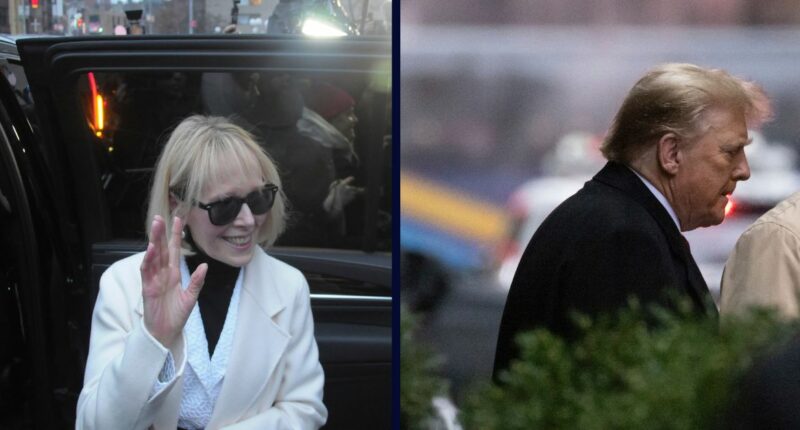Share this @internewscast.com
Left: E. Jean Carroll, a former magazine columnist, enters a vehicle outside Manhattan federal court on January 26, 2024, after the verdict in her second defamation trial against ex-U.S. president Donald Trump (Photo by Jimin Kim / SOPA Images/Sipa USA)(Sipa via AP Images). Right: Former President Donald Trump exits his apartment building on Friday, January 26, 2024, in New York (AP Photo/Yuki Iwamura).
A panel consisting of three judges upheld a $5 million judgment on Thursday, unanimously rejecting President Donald Trump’s request for a new civil trial concerning defamation and sexual abuse claims made by E. Jean Carroll. The court wrote that he “has not demonstrated that the district court erred in any of the challenged rulings,” including the decision to admit the “Access Hollywood” tape as evidence.
“Mr. Trump now appeals, contending that the district court (Lewis A. Kaplan, Judge) erred in several of its evidentiary rulings,” the 2nd U.S. Circuit Court of Appeals outlined in a per curiam decision. It referenced the “Access Hollywood” tape among other evidence. “These include its decisions to admit the testimony of two women who alleged that Mr. Trump sexually assaulted them in the past and to admit a recording of part of a 2005 conversation in which Mr. Trump described to another man how he kissed and grabbed women without their consent. Mr. Trump contends that these and other asserted errors entitle him to a new trial.”
Senior U.S. Circuit Judge Denny Chin, Senior U.S. Circuit Judge Susan Carney, and U.S. Circuit Judge Myrna Pérez proved to be the tough panel draw that they seemed at the outset, concluding that Trump fell short of showing that Senior U.S. District Judge Lewis Kaplan “erred” and that Trump did not show how “any claimed error or combination of claimed errors affected his substantial rights as required to warrant a new trial.”
Carroll, an advice columnist, alleged — and a jury believed — Trump was liable for assaulting her in the dressing room of a Bergdorf Goodman store in New York in the 1990s, and then defaming her decades later when she spoke out. A $5 million judgment followed.
Oral arguments in the appeal were held in September, and during the proceeding Chin remarked to Trump attorney D. John Sauer that it was “very hard to overturn a jury verdict based on evidentiary rulings.”
Still, Sauer argued that the trial judge erred by allowing into evidence the “Access Hollywood” tape of Trump’s “grab them by the p—y” remark, and by allowing in the testimony of other Trump accusers Jessica Leeds and Natasha Stoynoff, who were not part of the complaint.
Love true crime? Sign up for our newsletter, The Law&Crime Docket, to get the latest real-life crime stories delivered right to your inbox.
The panel of judges found that the evidence supported Carroll’s position that Trump had engaged in strikingly similar behavior in other scenarios.
“We conclude that the Access Hollywood tape described conduct that was sufficiently similar in material respects to the conduct alleged by Ms. Carroll (and Ms. Leeds and Ms. Stoynoff) to show the existence of a pattern tending to prove the [act], and not mere propensity,” the judges wrote. “Mr. Trump’s statements in the tape, together with the testimony of [Leeds and Stoynoff], establish a repeated, idiosyncratic pattern of conduct consistent with what Ms. Carroll alleged.”
“In each of the three encounters, Mr. Trump engaged in an ordinary conversation with a woman he barely knew, then abruptly lunged at her in a semi-public place and proceeded to kiss and forcefully touch her without her consent,” the ruling continued. “The acts are sufficiently similar to show a pattern or ‘recurring modus operandi.'”
Carroll attorney Roberta Kaplan at one point during arguments countered that she could “lose all the propensity evidence and it would still be harmless error.”
In the end, the panel agreed Carroll’s case was strong, affirmed the judgment below, and held that the “jury made its assessment of the facts and claims on a properly developed record.”
“Even assuming arguendo that the district court erred in some of these evidentiary rulings — a proposition that we have rejected — taking the record as a whole and considering the strength of Ms. Carroll’s case, we are not persuaded that any claimed error or combination of errors in the district court’s evidentiary rulings affected Mr. Trump’s substantial rights,” the panel wrote.
During June 24 oral arguments in Trump’s appeal of the separate $83 million defamation judgment that fell in Carroll’s favor, another 2nd panel that Chin was part of seemed skeptical of Trump’s immunity-focused assertions. That panel has yet to issue a decision.
















